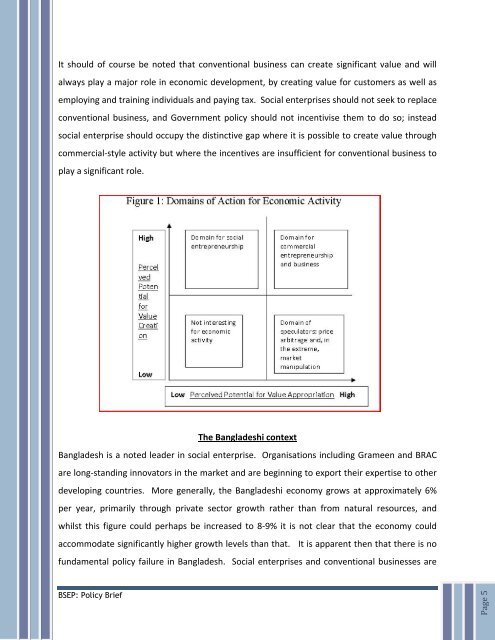Bangladesh Social Enterprise Project - Bangladesh Enterprise Institute
Bangladesh Social Enterprise Project - Bangladesh Enterprise Institute Bangladesh Social Enterprise Project - Bangladesh Enterprise Institute
The Bangladesh Social Enterprise Project (BSEP) took a deliberately agnostic view of the debates around ownership, legal structure and dividends, believing that different social enterprise opportunities may benefit from different approaches. We believe that a more useful definition is supplied by Professor Jose Santos of INSEAD business school in his paper ‘A Positive Theory of Social Entrepreneurship’ 5 . His definition makes clear the economic role of social enterprise and clarifies how it relates to conventional commercial activity, charities, Governments and social activism. Santos argues that conventional business focuses on value creation followed by value appropriation. However there may be situations where positive externalities are created, where a business could create significant value but be unable to appropriate it. These sorts of activities would tend to be under‐supplied by the market as business people would have insufficient incentive to do them. Whilst Government may seek to correct such market failures, it often will not do so on behalf of groups which lack power or representation. The opportunity for social entrepreneurs therefore arises from a combination of market and political failure, and a social enterprise is defined as an activity which focuses primarily on value creation rather than value appropriation. 5 2009. Available at http://www.insead.edu/facultyresearch/centres/social_entrepreneurship/research_resources/documents/2009‐ 23.pdf BSEP: Policy Brief Page 4
It should of course be noted that conventional business can create significant value and will always play a major role in economic development, by creating value for customers as well as employing and training individuals and paying tax. Social enterprises should not seek to replace conventional business, and Government policy should not incentivise them to do so; instead social enterprise should occupy the distinctive gap where it is possible to create value through commercial‐style activity but where the incentives are insufficient for conventional business to play a significant role. The Bangladeshi context Bangladesh is a noted leader in social enterprise. Organisations including Grameen and BRAC are long‐standing innovators in the market and are beginning to export their expertise to other developing countries. More generally, the Bangladeshi economy grows at approximately 6% per year, primarily through private sector growth rather than from natural resources, and whilst this figure could perhaps be increased to 8‐9% it is not clear that the economy could accommodate significantly higher growth levels than that. It is apparent then that there is no fundamental policy failure in Bangladesh. Social enterprises and conventional businesses are BSEP: Policy Brief Page 5
- Page 1 and 2: 2010 Bangladesh Social Enterprise P
- Page 3: Bangladesh Social Enterprise Projec
- Page 7 and 8: easonable rate of return, meaning t
- Page 9 and 10: 4.2 Implications for local and mult
- Page 11 and 12: stages of ideas. Whilst some good i
- Page 13 and 14: ANNEXURE BSEP: Policy Brief Page 13
- Page 15 and 16: BIJOY (Bangladesh Institute of Job
- Page 17 and 18: S h a s t h o Transforming Healthca
- Page 19 and 20: BUSINESS MODEL: Input 648 candidate
- Page 21 and 22: The DRIVEN platform is built around
- Page 23 and 24: ANNEX B CASE STUDIES OF BANGLADESHI
- Page 25 and 26: “Rural Sales Program: Empowering
- Page 27 and 28: “Dietary Supplement Sachets and I
- Page 29 and 30: “Waste Recycling, Energy, Poverty
- Page 31 and 32: “Medical Care, Education, Empower
- Page 33 and 34: “Create a Harmonious Work Environ
- Page 35 and 36: “Rural Centre Model Creating Flex
- Page 37 and 38: Study on the Perception of Social E
- Page 39 and 40: initiative and environmental issues
- Page 41 and 42: ANNEX C - LITERATURE REVIEW This an
- Page 43 and 44: foster development’ It examines w
- Page 45 and 46: The publication outlines the basics
- Page 47 and 48: which traditional capitalism cannot
- Page 49 and 50: Berkes, F. & Davidson‐Hunt, I. J.
- Page 51 and 52: Husted, B. W. & Allen, D.B. 2007.
- Page 53 and 54: strategic alternate, but requires t
It should of course be noted that conventional business can create significant value and will<br />
always play a major role in economic development, by creating value for customers as well as<br />
employing and training individuals and paying tax. <strong>Social</strong> enterprises should not seek to replace<br />
conventional business, and Government policy should not incentivise them to do so; instead<br />
social enterprise should occupy the distinctive gap where it is possible to create value through<br />
commercial‐style activity but where the incentives are insufficient for conventional business to<br />
play a significant role.<br />
The <strong>Bangladesh</strong>i context<br />
<strong>Bangladesh</strong> is a noted leader in social enterprise. Organisations including Grameen and BRAC<br />
are long‐standing innovators in the market and are beginning to export their expertise to other<br />
developing countries. More generally, the <strong>Bangladesh</strong>i economy grows at approximately 6%<br />
per year, primarily through private sector growth rather than from natural resources, and<br />
whilst this figure could perhaps be increased to 8‐9% it is not clear that the economy could<br />
accommodate significantly higher growth levels than that. It is apparent then that there is no<br />
fundamental policy failure in <strong>Bangladesh</strong>. <strong>Social</strong> enterprises and conventional businesses are<br />
BSEP: Policy Brief<br />
Page 5



